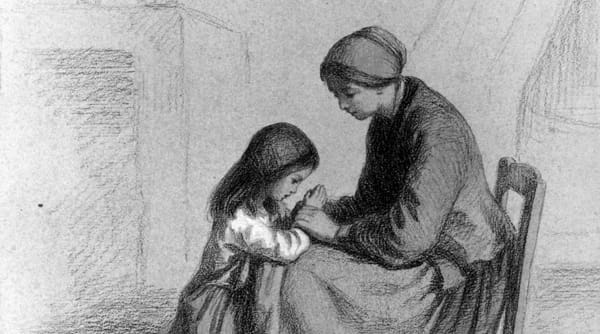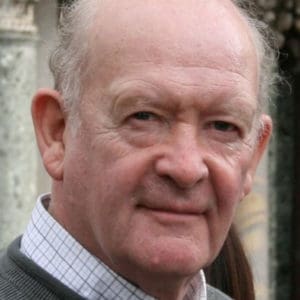Mini-Course on Prayer
Part 6 OUR “U” – In Union, The Mystical Body
In my last article dealing with vocal prayer, I used the words Our Father as a memory jog. I did this so that each letter of the two words Our Father could act as a reminder of the essential features of daily prayer. Last time, I showed how the letter -O- can remind us to begin our day with the Morning Offering. Let me move on to show how the letter -U- can remind us of something further, something so profound that it will change our whole attitude to prayer for ever. It was my mother who first taught me what it was, something that I could never forget. She said that even though I may make my morning offering alone by the side of my bed, I was not alone. Nor would I be alone even if I became a hermit and lived in the middle of some distant desert, or a prisoner locked up in solitary confinement at the other side of the world. My prayer would always be made in, with and through Our Lord, and so with all other Christians wherever they are. She quoted the Our Father to press her point home.
The Mystical Family
When we petition the Father, we do not petition him for ourselves alone as the prayer makes abundantly clear. It says,
“Give us this day our daily bread and forgive us our trespasses as we forgive those who trespass against us, and lead us not into temptation, but deliver us from evil. Amen.”
She taught me further that praying to the Father in Christ, in his mystical body, also means praying with all those who have died and who are now alive again in him. That means with Mary and Joseph, with Saint Peter and Saint Paul, Saint Dominic and Saint Francis, with Saint Catherine of Siena, Saint Teresa of Avila and Saint Thérèse of Lisieux, and all the other great saints and mystics. It also means praying for, with, and to all my own relatives and friends both living and dead, who are alive again in him, and all who are dead, but not yet fully alive in Christ. She especially taught me 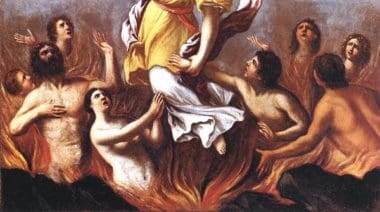 to pray for the Holy Souls, those who have died but who are not yet fully prepared to be united with the Risen One for the sins and the fruits of their sins that keep them at bay until they are purified away. Unlike things cannot be united, so we must be cleansed from all that prevents us from having full union with Jesus, and we must be cleansed either in this life or in the next, before that which we desire more than anything else can take place. My mother also told me that this was the perfect opportunity to pray for others too, especially those who have asked me to pray for them. She said when you hear about people who are suffering all over the world, on the radio, the television or in the newspaper, you can reach out to them through prayer, because prayer is not limited by space and time as we are.
to pray for the Holy Souls, those who have died but who are not yet fully prepared to be united with the Risen One for the sins and the fruits of their sins that keep them at bay until they are purified away. Unlike things cannot be united, so we must be cleansed from all that prevents us from having full union with Jesus, and we must be cleansed either in this life or in the next, before that which we desire more than anything else can take place. My mother also told me that this was the perfect opportunity to pray for others too, especially those who have asked me to pray for them. She said when you hear about people who are suffering all over the world, on the radio, the television or in the newspaper, you can reach out to them through prayer, because prayer is not limited by space and time as we are.
A Lesson from Padre Pio
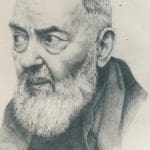 One morning a lay brother, thinking that Padre Pio was out, burst into his room as he was lost in prayer. The saint dismissed his apologies with the words, “I was only praying for a happy death for my Father.” “But your Father died two years ago,” the brother said, looking rather surprised. Padre Pio looked at him in disbelief. “I know he did.” Prayer is not limited by the laws of space and time and that is why, although Saint Thérèse of Lisieux never left her Carmelite monastery, she was made patroness of the missions. The wonderful thing about praying for others at this time of the day is that they can be included in the prayer that is the rest of your day, as you try to offer up all you say and do for the honour and glory of God.
One morning a lay brother, thinking that Padre Pio was out, burst into his room as he was lost in prayer. The saint dismissed his apologies with the words, “I was only praying for a happy death for my Father.” “But your Father died two years ago,” the brother said, looking rather surprised. Padre Pio looked at him in disbelief. “I know he did.” Prayer is not limited by the laws of space and time and that is why, although Saint Thérèse of Lisieux never left her Carmelite monastery, she was made patroness of the missions. The wonderful thing about praying for others at this time of the day is that they can be included in the prayer that is the rest of your day, as you try to offer up all you say and do for the honour and glory of God.
OUR “R” – Reviewing the Day Ahead
Despite what I have just said, it must be emphasised that the Morning Offering is not a magic formula. It does not automatically transform the forthcoming day, and that is why something further is required. After making the Morning Offering spend a few minutes reviewing the day ahead, 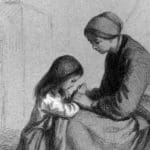 making a few resolutions that would enable you to try to consecrate every moment of the day to loving God. It might be by pausing for brief moments of prayer during the day, as the early Christians had been taught to do by Jesus himself, but also in doing humdrum tasks that we keep putting off, like changing the sheets on the beds, putting air into the car tyres, defrosting the freezer or something that is more important. There is always that friend or relative who is sick or in need, whom we should telephone, or write to, or even visit for a few minutes. Alternatively, perhaps we should make a resolution to apologize to one of the family, a friend, or someone at work for the way we behaved towards them the previous day. It is very difficult to stand up for someone who has been abused by authority at work, or elsewhere, or to speak the truth when no one wants to hear it, or to make a stand for what we know is right. But nevertheless, these are some of the more important things that could occupy our minds as part of Morning Prayer. Perhaps we could end with the most important resolution of all, to try and make the forthcoming day a day when we try as best we can to enable God’s love to draw us up, not just into the life of Christ, but into his priestly action. In this way, every day is a day in which we spend every single moment trying to observe the New Commandments, firstly by loving God, and then by loving him in the neighbour in need, just as Jesus did.
making a few resolutions that would enable you to try to consecrate every moment of the day to loving God. It might be by pausing for brief moments of prayer during the day, as the early Christians had been taught to do by Jesus himself, but also in doing humdrum tasks that we keep putting off, like changing the sheets on the beds, putting air into the car tyres, defrosting the freezer or something that is more important. There is always that friend or relative who is sick or in need, whom we should telephone, or write to, or even visit for a few minutes. Alternatively, perhaps we should make a resolution to apologize to one of the family, a friend, or someone at work for the way we behaved towards them the previous day. It is very difficult to stand up for someone who has been abused by authority at work, or elsewhere, or to speak the truth when no one wants to hear it, or to make a stand for what we know is right. But nevertheless, these are some of the more important things that could occupy our minds as part of Morning Prayer. Perhaps we could end with the most important resolution of all, to try and make the forthcoming day a day when we try as best we can to enable God’s love to draw us up, not just into the life of Christ, but into his priestly action. In this way, every day is a day in which we spend every single moment trying to observe the New Commandments, firstly by loving God, and then by loving him in the neighbour in need, just as Jesus did.
A Lesson from St Martin
The spirituality of the Middle Ages was deeply influenced by a story that everybody knew from their childhood. It was the story of a Roman soldier and of his act of compassion for a fellow human being. The Roman soldier was later to become Saint Martin, Bishop of Tours who was born at the beginning of the fourth century. He was still only a Catechumen when, on a cold winter’s night he cut his cloak in half to clothe a half-naked man who was starving to death outside the city gate. When the story was told that the poor man was in fact Christ, its impact was immense and lasting. Pope Francis had a similar experience of the poor when he became Bishop. He learnt something deep and profound that he has since tried to convey to 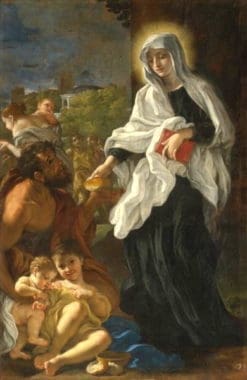 others. On the Vigil of Pentecost, he asked his audience a rhetorical question. “Do you give alms to the poor?” Receiving the expected answer, he said, “Very good, but when you give alms to the poor, do you look them in the eye, do you touch their hands?” We are not changed just by giving, but by the way in which we give. This is the insight that Pope Francis discovered for himself. It is in the way in which we give to the poor that we can discover Christ in them, and through this experience be changed ourselves, as others have been changed before us.
others. On the Vigil of Pentecost, he asked his audience a rhetorical question. “Do you give alms to the poor?” Receiving the expected answer, he said, “Very good, but when you give alms to the poor, do you look them in the eye, do you touch their hands?” We are not changed just by giving, but by the way in which we give. This is the insight that Pope Francis discovered for himself. It is in the way in which we give to the poor that we can discover Christ in them, and through this experience be changed ourselves, as others have been changed before us.
One of the Most Important Truths
One of the most important truths of the spiritual life that we neglect at our peril is that we will not ultimately be judged by the wonderful feelings that we have experienced in prayer. We will not be asked how many ecstasies we have had or even how many miracles we have worked, or people we have healed, but how we have served God in the neighbour in need. But if we fail to do this, then we will be condemned to hear these frightening words, “Go away from me… for I was hungry and you never gave me food…” (Matthew 25:41-46). The Morning Offering and its implementation then, is not just a nice, pious practice for those who have the time to do it, but something on which our ultimate destination depends. It is the place where the whole of the forthcoming day is dedicated to loving God through a continual process of prayer, self-sacrifice and the service of others. In this way all that is said, done and suffered, all that is enjoyed and celebrated, is offered in, through and with Jesus to our common Father. This is the new worship “in spirit and in truth” (John 4:24), that Jesus promised to the Samaritan woman. This is how we take part in the priestly action of Jesus every moment of every day of our lives.
These ideas are developed further in my two major works on prayer – Wisdom from the Western Isles and Wisdom from the Christian Mystics, and Wisdom from Franciscan Italy that shows how deep contemplative prayer grows to perfection in the Life of St Francis of Assisi.
Editor’s Note: In Part 7, David Torkington will examine the letters F (faith) and A (abandonment) as he continues his explanation of the “OUR FATHER” mnemonic useful for keeping God and prayer at the forefront of our lives.
+
Art for this post on union in the mystical body: Detail of An Angel Frees the Souls of Purgatory, Ludovico Carracci, circa 1610, PD-US author’s life plus 100 years or less; Father Pio de Pietrelcina, Roberto Dughetti, 1966, CCA-SA 3.0 Unported; Child Praying at Mother’s Knee, Pierre-Édouard Frère, 1864, PD-Worldwide; The Blessed Ludovica Albertoni Distributing Alms, Giovanni Battista Gaulli, circa 1670-71, PD-US author’s life plus 100 years or less; all Wikimedia Commons.



